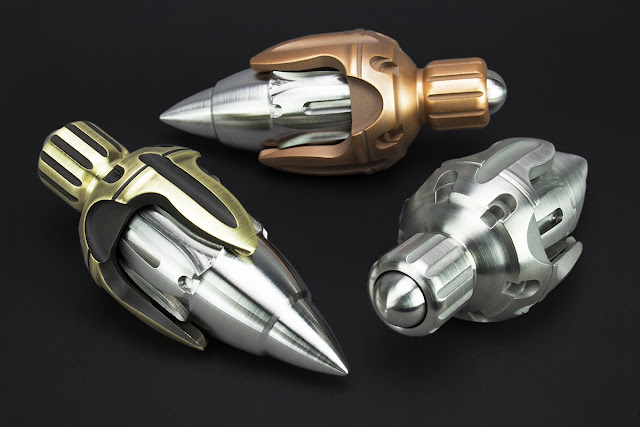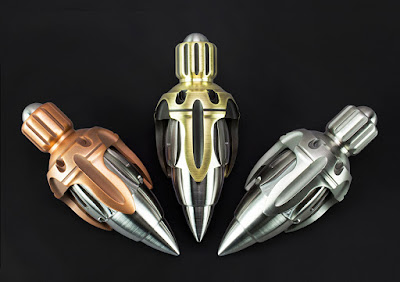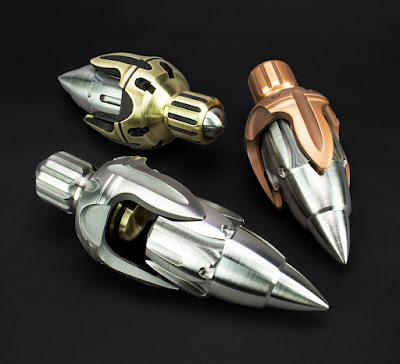Machined Metal Ampoule, or the AMP for short.
Introducing the fourth installment of a growing series of mechanical vessel sculptures. As I continue to explore various aspects of modern machine work as a fine art craft, I have found that one line of inquiry in particular continues to occupy a disproportionate share of my attention.
More specifically, I am talking about my projects that involve examining the traditional craft forms of other industrial mediums (wood turning, knife making, glass work, ceramics etc) through the lens of my own craft (machining). It is quickly becoming an obsession of mine and has helped me better understand the ways in which my process is becoming more widely adopted as a sculptural medium. It has proven personally fruitful for me as a sculptor as well.
Following on the heels of the SMV3, which was one of the larger and more complex editions I have made to date, I was craving something a bit simpler and minimal to approach next. An ampoule seemed to fit the bill perfectly.
While the term "ampoule" has a more formal definition and is commonly understood as a small, sealed glass cylinder or medical implement, anyone who has dabble in any sort of fictional or fantasy nomenclature (or even the world of perfume) knows the word “ampoule” has been used more liberally with a much wider range of variation of forms and contexts.
With this project, I went with a bit broader interpretation when deciding what an object like this might be. The result is a sculptural object that is, from a mechanical perspective, a bit less flashy than some of my other vessels. But just like the others, it excels at being a striking aesthetic object.
It was also an opportunity to combine some of my previous research on Chinese snuff bottles with some of the defining elements of what an ampoule might be. There is a surprising amount of overlap between the two objects.
As I mentioned already, the mechanical functionality of this work is rather simple when compared to its predecessors, but it is no less interesting from a design perspective.
I wanted this vessel to be truly air and water tight, and while achieving that is not really all that difficult, making something that seals well and is also pleasing to look at while having interesting functionality often is.
Balancing all of those things in this work, as well as previous ones, has taught me so much more about making formal sculpture than I ever anticipated, which is why I continue to pursue these projects. My appreciation for the overlapping spheres of craft, design, and art continues to grow with each new edition.
On the technical side, the lid and container parts have a geometry that neatly fits each other much like a keyed shaft. The turned features, before being milled, are sized such that the two halves would never fit together. It is only by selective removing material from the lid, and creating slots in the vessel, that they are able to slide together, seating a spring loaded plunger, that floats inside of the lid, onto a tapered opening in the lower vessel.
Once the plunger seats, the lid can be rotated into a position where it can use the spring tension to lift back up and hook into a series of notches in the vessel.
The work is a little large for an ampoule (3.75"x1.5"D) but I wanted it to be a scale that fits well in the hand, as well as have some useful space inside. It can still easily be pocketed if you are brave enough to do so.
Some of you will rightly look at this design and point out that it does not stand on its own. Something that might be problematic if you actually wanted to use it for some purpose. You wouldn’t be wrong.
One of the things that appealed to me about many glass ampoules, is that they are sealed single use type objects, and so they don’t really need to stand. They are often just dispensed from a box or holder of some sort. As a sculptor who often struggles with that pesky interface between the real world, gravity, and my creative ideas, I felt this was a great excuse to make an object that while utilitarian, was free of the constraint of needing to stand on its own.
It is an allusion to the object that inspired it, but it also helps reinforce that it is an object meant to be appreciated for its aesthetics ahead of its functionality.
That being said, while I have never really liked making overt stands for my work, and I try where I can to make work that does not require them, in the end, I did have to make a small concession. I realized people might want (or need) this piece to stand in certain contexts, in order to put it to some real use. So I made a no frills accessory stand out of Delrin for the Ampoule to rest in.
The stand is purely functional, and I don’t really consider it part of the actual work, but for practical reasons, I knew I needed to include it. So while it won't appear in any of the official photos, I plan to provide these to all of you who want to add one to your collection.
I would also encourage anyone who is game to design, turn, or 3D print something of their own. I think their is a lot of room to get very elaborate with something like that, however, I wanted to remain focused on the actual object for the time being.
Which brings me to the portion of this post reserved for the collectors among you.
Like all of the objects in this series, an edition is certainly going to be on offer very shortly.
The AMP will be a bit more affordable than the last few projects. So while it is a nice contrast to previous vessel pieces, hopefully it also opens the door a little wider to some of you collectors who have found yourselves priced out as of late. Affordability is a relative term, but those of you have been following along probably know what to expect from a piece like this.
I have a bit more work to do to finalize the pricing, but details for a sign up and a link will be posted at the end of the week. (lets say November 8th)
So look for a second update very soon.
As always, comments and questions are welcome.

















































